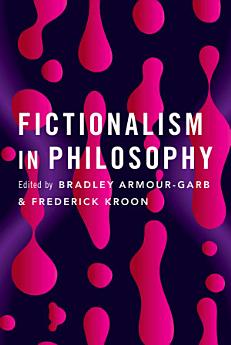Fictionalism in Philosophy
Bradley Armour-Garb · Frederick Kroon
dic 2019 · Oxford University Press
Libro electrónico
288
Páginas
family_home
Apto
info
reportLas calificaciones y opiniones no están verificadas. Más información
Acerca de este libro electrónico
There are things we routinely say that may strike us as literally false but that we are nonetheless reluctant to give up. This might be something mundane, like the way we talk about the sun setting in the west (it is the earth that moves), or it could be something much deeper, like engaging in talk that is ostensibly about numbers despite believing that numbers do not literally exist. Rather than regard such behaviour as self-defeating, a "fictionalist" is someone who thinks that this kind of discourse is entirely appropriate, even helpful, so long as we treat what is said as a useful fiction, rather than as the sober truth. "Fictionalism" can be broadly understood as a view that uses a notion of pretense or fiction in order to resolve certain puzzles or problems that otherwise do not necessarily have anything to do with literature or fictional creations. Within contemporary analytic philosophy, fictionalism has been on the scene for well over a decade and has matured during that time, growing in popularity. There are now myriad competing views about fictionalism and consequently the discussion has branched out into many more subdisciplines of philosophy. Yet there is widespread disagreement on what philosophical fictionalism actually amounts to and about how precisely it ought to be pursued. This volume aims to guide these discussions, collecting some of the most up-to-date work on fictionalism and tracing the view's development over the past decade. After a detailed discussion in the book's introductory chapter of how philosophers should think of fictionalism and its connection to metaontology more generally, the remaining chapters provide readers with arguments for and against this view from leading scholars in the fields of epistemology, ethics, metaphysics, philosophy of science, philosophy of language, and others.
Acerca del autor
Bradley Armour-Garb is Professor of Philosophy at the University at Albany-SUNY and was a fellow of Wolfson College, Oxford. His research focuses on issues in metaphysics, the philosophy of language, and philosophical logic and he has published articles in these areas in a number of journals including, but not limited to, Analysis, The Aristotelian Society, The Journal of Philosophy, The Journal of Philosophical Logic, Noûs, and Philosophy and Phenomenological Research. He is on the editorial board at The American Philosophical Quarterly, and he will be starting as chair of his department in Fall 2019. Frederick Kroon is Professor of Philosophy at the University of Auckland. His main research areas are philosophical logic, philosophy of language, and metaphysics, and he has authored papers in these and other areas for a range of journals, including Analysis, Philosophy and Phenomenological Research, The Philosophical Review, The Journal of Philosophy, Ethics, and Noûs. He is on the editorial board of the Australasian Journal of Philosophy and is a subject editor for 20th Century Philosophy for the Stanford Encyclopedia of Philosophy.
Califica este libro electrónico
Cuéntanos lo que piensas.
Información de lectura
Smartphones y tablets
Instala la app de Google Play Libros para Android y iPad/iPhone. Como se sincroniza de manera automática con tu cuenta, te permite leer en línea o sin conexión en cualquier lugar.
Laptops y computadoras
Para escuchar audiolibros adquiridos en Google Play, usa el navegador web de tu computadora.
Lectores electrónicos y otros dispositivos
Para leer en dispositivos de tinta electrónica, como los lectores de libros electrónicos Kobo, deberás descargar un archivo y transferirlo a tu dispositivo. Sigue las instrucciones detalladas que aparecen en el Centro de ayuda para transferir los archivos a lectores de libros electrónicos compatibles.







